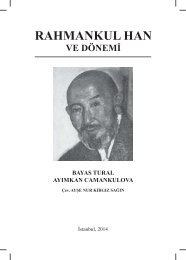THE SOVIET HISTORIOGRAPHY AND THE QUESTION OF KAZAKHSTAN’S HISTORY
SOVYET-TARIH-YAZICILIGI-ENG
SOVYET-TARIH-YAZICILIGI-ENG
You also want an ePaper? Increase the reach of your titles
YUMPU automatically turns print PDFs into web optimized ePapers that Google loves.
<strong>THE</strong> <strong>QUESTION</strong> <strong>OF</strong> <strong>KAZAKHSTAN’S</strong> <strong>HISTORY</strong> 179<br />
I had one-sided point of view on the event. Now when we can look<br />
at events more broadly, I realize that Denikin’s movements are part<br />
of our history and it isn’t the way we explained before.” 328<br />
“I do not reject my works that I wrote in the 50s, 60s or 70s. But<br />
this should not mean that I am satisfied with every aspect of my<br />
works, because I would write differently in these days. The reason<br />
for this is not just that I obtained new knowledge or broadened my<br />
horizon, but perhaps that I know events more deeply.” 329<br />
The historian of the Soviet period, Jemil Guliev, in the introduction<br />
of the book that collects old articles of the post-Soviet period,<br />
focuses on the evaluation according to the historians of particular<br />
period, and emphasizes that in new published work there is no need<br />
for quotations, therefore, they should be replaced by expressions. 330<br />
In fact, the Soviet historian did not write his works for Lenin,<br />
Stalin or Marx. They wrote based on their, and at the same time, on<br />
party’s documents, but not for them. They wrote in order to get to<br />
know, research, and strengthen the country. Conditions of each era<br />
are different, so the Soviet historians of a particular era should be<br />
evaluated according to their period.<br />
Conclusion<br />
The Soviet system, as well as any political system, bred a generation<br />
of historians to legitimize it, to believe and trust in it, and to<br />
educate the masses in order to ensure its continuity. It continued to<br />
move along with the Tsarist era historians at the beginning of the<br />
journey, as there were not enough historians loyal to its ideology.<br />
However, as the system gained strength, it refused the structure of<br />
historians that belonged to an older generation, and continued to<br />
lead the way with newly educated Soviet historians. Moreover, as<br />
the system gained strength, Soviet historians began to adhere to<br />
the system more closely. They had already become the part of that<br />
system. Therefore, they were in the founding team and became the<br />
ones who ensured its continuity. In doing so, at the same time, they<br />
were the system’s servants.<br />
The new scholarly cadre was “armed” with the methodology of<br />
Marxism-Leninism. History was seen and used as an important weapon<br />
in the struggle of the Soviet regime against other political systems.<br />
328 Поляков, Ю. А. “Путпознaния истории”, Отечественнaя история, Moscow,<br />
1996, No. 6, pp. 148.<br />
329 Gurevich, p. 16.<br />
330 Guliyev, Cemil, Tarih, Düşünceler, Müyahizeler, Geydler (1953-2003), Bakü 2004, p. 6.



